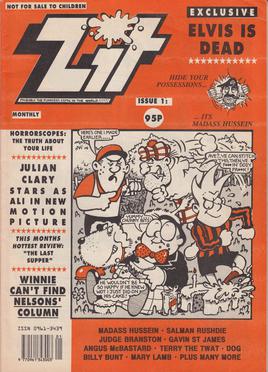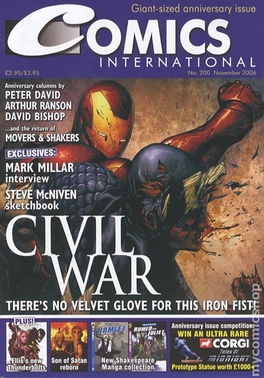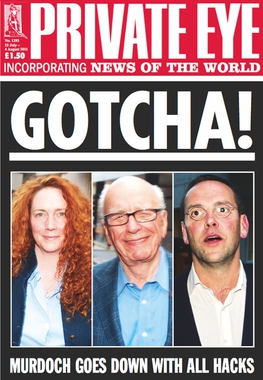Related Research Articles
The Beano is a British anthology comic magazine created by Scottish publishing company DC Thomson. Its first issue was published on 30 July 1938, and it became the world's longest-running comic issued weekly in 2018, publishing its 4000th issue in August 2019. Popular and well-known comic strips and characters include Dennis the Menace, Minnie the Minx, The Bash Street Kids, Roger the Dodger, Billy Whizz, Lord Snooty and His Pals, Ivy the Terrible, General Jumbo, Jonah, and Biffo the Bear.

A comic strip is a sequence of drawings, often cartoons, arranged in interrelated panels to display brief humor or form a narrative, often serialized, with text in balloons and captions. Traditionally, throughout the 20th and into the 21st century, these have been published in newspapers and magazines, with daily horizontal strips printed in black-and-white in newspapers, while Sunday papers offered longer sequences in special color comics sections. With the advent of the internet, online comic strips began to appear as webcomics.

A cartoon is a type of visual art that is typically drawn, frequently animated, in an unrealistic or semi-realistic style. The specific meaning has evolved over time, but the modern usage usually refers to either: an image or series of images intended for satire, caricature, or humor; or a motion picture that relies on a sequence of illustrations for its animation. Someone who creates cartoons in the first sense is called a cartoonist, and in the second sense they are usually called an animator.

Viz is a British adult comic magazine founded in 1979 by Chris Donald. It parodies British comics of the post-war period, notably The Beano and The Dandy, but with extensive profanity, toilet humour, black comedy, surreal humour and generally sexual or violent storylines. It also sends up tabloid newspapers, with mockeries of articles and letters pages. It features parody competitions and advertisements for overpriced 'limited edition' tat, as well as obsessions with half-forgotten kitsch celebrities from the 1960s to the 1980s, such as Shakin' Stevens and Rodney Bewes. Occasionally, it satirises current affairs and politicians, but it has no particular political standpoint.
A British comic is a periodical published in the United Kingdom that contains comic strips. It is generally referred to as a comic or a comic magazine, and historically as a comic paper.
Plug was a British comic magazine that ran for 75 issues from 24 September 1977 until 24 February 1979, when it merged with The Beezer. It was edited by Ian Gray.

British humour carries a strong element of satire aimed at the absurdity of everyday life. Common themes include sarcasm, tongue-in-cheek, banter, insults, self-deprecation, taboo subjects, puns, innuendo, wit, and the British class system. These are often accompanied by a deadpan delivery which is present throughout the British sense of humour. It may be used to bury emotions in a way that seems unkind in the eyes of other cultures. Jokes are told about everything and almost no subject is off-limits, though a lack of subtlety when discussing controversial issues is sometimes considered insensitive. Many British comedy series have become successful internationally, serving as a representation of British culture to overseas audiences.
Smut was a British adult comics magazine that was launched on 1 May 1989.

Zit was an adult British comic that was published by Humour Publications UK, beginning with a free sample issue in January 1991, and with issue 1 in February 1991.

Escape magazine was a British comic strip magazine founded and edited by Paul Gravett and Peter Stanbury. Nineteen issues were published between 1983 and 1989. Eddie Campbell, Phil Elliott and Glenn Dakin were amongst the many cartoonists published within its pages. Escape Publishing also released a limited number of graphic novels in the period 1984–1989, some co-published with Titan Books.
Toxic! was a British comic that was published weekly from March 28 to October 24, 1991, by Apocalypse Ltd, with a total of 31 issues.
British small press comics, once known as stripzines, are comic books self-published by amateur cartoonists and comic book creators, usually in short print runs, in the UK. They're comparable to similar movements internationally, such as American minicomics and Japanese doujinshi. A "small press comic" is essentially a zine composed predominantly of comic strips. The term emerged in the early 1980s to distinguish them from zines about comics. Notable artists who have had their start in British small press comics include Eddie Campbell, Paul Grist, Rian Hughes, Jamie Hewlett, Alan Martin, Philip Bond and Andi Watson.
UT was a British adult comic that was published monthly in the mid-1990s.

Comics International was a British news and reviews magazine about comic books. Founded in 1990, it was published monthly by Quality Communications until 2006, and then by Cosmic Publications Ltd. until 2010.

Charles Adolphus Williams, MBE was an English professional footballer who was one of the first black players in British football after the Second World War, and later became Britain's first well-known black stand-up comedian.
Oludotun Davey Moore "Dotun" Adebayo is a British radio presenter, writer, and publisher. He is best known for his work on Up All Night on BBC Radio 5 Live, as well as the obituary programme Brief Lives.
Ed Pinsent is a British cartoonist, artist, and writer.
Biff is a British cartoon strip, created since the mid 1970s by Chris Garratt and Mick Kidd. The first Biff collection was published in 1982 The strip was first published in the newspaper The Guardian in 1985. Biff Weekend ran there weekly for 20 years. The comic originated in a series of single-panel postcards before evolving into multi-panel comic strips. It has also been published in the magazine Viz, fRoots and since 2001 in the magazine of the Rough Guides.
Wilson the Wonder Athlete was a British comic strip, first published in 1943 in the British illustrated story paper The Wizard published by D. C. Thomson & Co. It follows the sporting adventures of a heroic character named William Wilson. The stories were written by Gilbert Lawford Dalton and drawn by Jack Glass. The stories ran until 1984 in various British magazines.

Private Eye is a British fortnightly satirical and current affairs news magazine, founded in 1961. It is published in London and has been edited by Ian Hislop since 1986. The publication is widely recognised for its prominent criticism and lampooning of public figures. It is also known for its in-depth investigative journalism into under-reported scandals and cover-ups.
References
- 1 2 3 Owusu, Kwesi (2003). Black British Culture and Society: A Text Reader. Routledge. p. 186. ISBN 9781134684151.
- 1 2 3 4 Clifton, Jamie (13 June 2014). "Did You Know Britain Had a 'Black Viz'?". VICE.
- 1 2 Gravett, Paul. "Comics Unmasked: Art and Anarchy In The UK". www.paulgravett.com.
- ↑ "3am Interview: BLACK EYED SKANK - INTERVIEW WITH BOBBY JOSEPH". www.3ammagazine.com. 3:AM Magazine. 2003. Retrieved 3 January 2016.
- ↑ Adebayo, Dotun (27 January 2015). "Je suis Skank: Black satire mag poked fun in the 90s". www.voice-online.co.uk. The Voice.